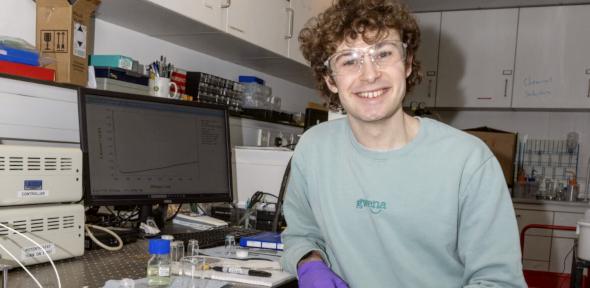
From growing up in South Wales to his current role enabling sustainable energy storage through his work as a PhD researcher on the Faraday Institution Science of Battery Safety (SafeBatt) project, James Simon's journey is a compelling tale.
James's pathway, which was featured recently in the Faraday Institution's Faraday Pathways series, underscores the importance of exploring diverse career options and the value of pursuing a career path that excites you.
Early inspirations
James grew up in a region of South Wales known for its coal mining heritage, and his family’s connection to the industry played a significant role in shaping his career aspirations.
“Growing up, my community links to coal mining meant I always had an awareness of the impact that coal mining had. The idea that despite playing a big part in the industrial revolution we can still contribute to a green revolution is particularly inspiring to me.”
High school work experiences
During his time at high school in Caerphilly, James had the opportunity to undertake several work experiences, which informed his ideas of what his future career might look like.
“For a while, I thought I might want to do geology, so, at the end of my GCSEs, I briefly worked for a geology company, SRK Consulting. I was analysing boreholes – looking at photos to determine where one rock type ended, and another began. They used this information to make 3D reconstructions of the ground to decide where to mine.
“I also gained experience with a highways agency, Skanska, alongside their geotechnical engineers, analysing soil to inform the likelihood of road erosion.”
James is now a PhD researcher working on the Faraday Institution’s SafeBatt project. He is supervised by Professor Stuart Clarke of this department, along with Professor Clare Grey and Dr Svetlana Menkin.
His work focuses on improving battery safety by determining causes of dendrite formation: metallic microstructures that can form on the negative electrode of lithium, sodium, and zinc metal batteries during the charging process. Dendrites can reduce battery performance, cause short circuiting, and, in some cases, lead to battery failure.
“Dendrites plague all sorts of battery systems, including batteries in our phones. My research uses scanning electrochemical microscopy to map surfaces and see where dendrites are likely to grow as a step towards developing strategies that prevent them forming in the first place.”
James is part of the Faraday Institution’s PhD Enrichment Scheme. He highlighted how the scheme has influenced his PhD experience.
“The Faraday Institution training has given me a broader understanding of the field. It’s easy to get caught up in the chemistry, but they’ve taught us to look at the bigger picture, like the environmental and ethical challenges in the battery industry. The networking opportunities have also been invaluable.”
Read the full Yusuf Hamied Department of Chemistry article

